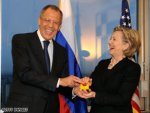- Joined
- Apr 18, 2013
- Messages
- 94,313
- Reaction score
- 82,703
- Location
- Barsoom
- Gender
- Male
- Political Leaning
- Independent
A Russian bank gave Marine Le Pen’s party a loan. Then weird things began happening.

Marine LePen and her handler, Vladimir Putin.
Lie down with Russian dogs ... you get Russian fleas. Le Pen knew exactly who she was aligning with, and even visited occupied Crimea to attract European far-right support for her Front National party.

Marine LePen and her handler, Vladimir Putin.
12/27/18
When French politician Marine Le Pen needed cash for her far-right party, an obscure Russian bank agreed to help. Four years later, the bank has gone bust. The owner is facing a warrant for his arrest. Former Russian military officers are demanding money. And the party’s treasurer is sending off some $165,000 every few months to a woman in Moscow, unsure of where the payments ultimately will go. The money failed to deliver Le Pen the French presidency in last year’s election, denying the Kremlin a powerful ally in the heart of Europe. Instead, the 9.4 million-euro loan, then worth $12.2 million, dragged her party into the shadowy underworld of Russian cross-border finance, putting it in league with people accused of having ties to Russian organized crime, money laundering and military operations. The Le Pen loan, analysts say, is an example of how Russian collusion works. After Putin sets out the vision, agents inside and outside the government begin executing it, hoping to score points with him if their gambits succeed. First Czech started out as a joint venture between a Czech state bank and a Russian lender. In the early 2000s, it became part of a Russian pipeline construction company that was subsequently acquired by the firm of a billionaire friend of Putin’s, Gennady Timchenko. Sometime in September 2014, the National Front’s treasurer, Wallerand de Saint Just, went to Moscow. At the bank’s headquarters, he had lunch with Popov and his colleagues and signed a contract that lent the National Front 9.4 million euros at an interest rate of 6 percent per year. The final repayment date was Sept. 23, 2019.
The secrecy didn’t last long. An investigative journalist at the French publication Mediapart exposed the deal 2 1/2 months after it was signed, setting off a firestorm of criticism and more reports from Mediapart and others about financial links between Russian individuals and the French far right. Le Pen dismissed the furor, saying at the time that she had no choice but to turn abroad for a loan and denying that the money influenced her political positions. Le Pen’s party did not respond to a request for comment. Back in Moscow, strange things began happening with the loan. In early 2016, First Czech started mysteriously shedding assets. Russian authorities alleged that millions of dollars in assets fraudulently flowed out the door as regulators closed in on the bank. Among them — the loan extended to Le Pen’s party. Russian regulators described First Czech’s assets as low-quality, saying the company had made loans to shell companies in excess of 19.2 billion rubles, or $277 million at the time. They placed the distressed bank under the management of provisional administrators. Within months, the bank had lost its Russian license, and later it was formally declared insolvent. Czech regulators later pulled the European license, too. The Alliance for Securing Democracy and C4ADS describe the loan in their forthcoming report as an example of how Russian state actors leverage allegedly illicit financial networks for political purposes. What is unclear is how often they do so, given that few such transactions have been exposed and political parties rarely receive formal loans from foreign banks.
Lie down with Russian dogs ... you get Russian fleas. Le Pen knew exactly who she was aligning with, and even visited occupied Crimea to attract European far-right support for her Front National party.


